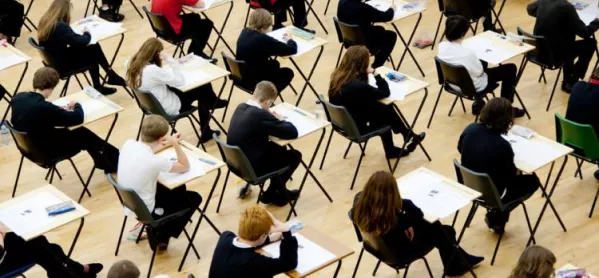- Home
- ‘I support the GCSE resit policy’
‘I support the GCSE resit policy’

There’s a wilful hypocrisy monopolising discourse on the 16-19 GCSE English retake policy.
Remember when Michael Gove suggested the return of O levels and was immediately met with accusations of creating a two-tier system that risked “labelling teenagers as failures”? No? Okay, well you must have sat through a few dozen assemblies on Carol Dweck’s growth mindset, Gladwells’s 10,000 hours, and Said’s bounce? No? Well fine, but surely one thing we all have in common is that we got into the business of teaching because we believe that our subject is both important and stimulating?
Of course, none of these things can be alien to anyone currently working in education. In fact many of us subscribe to these ideas and have actively perpetuated them. However, the belief in equality of opportunity, the faith that all learners can make progress, and having a passion for one’s subject all seem to be forgotten whenever anyone talks about 16-19 English.
‘It can’t be impossible’
The most offensive aspect of this selective hypocrisy is the idea that the General Certificate of Secondary Education, with its nine grades, is somehow “not the right fit” for some students. At my college this year, we have extended the opportunity to study GCSE to as many students as possible, regardless of starting point. These students have ended up making the most progress, and providing the most positive feedback of all. Ultimately, the English Language GCSE is about reading and writing, fiction and non-fiction; these are universally relevant. Sure, if you just take the sample materials produced by the exam board and try to stretch them into a course, it will be awful. But the freedom of the new course (which for better or worse has no novels, no Shakespeare - just a few short extracts) allows truly creative approaches. My team has been using lyrics from the likes of Ed Sheeran and Akala, articles about Beyoncé’s Instagram, and extracts from John Green and Bali Rai. We’ve begun experimenting with non-fiction material supplied by vocational tutors. Half of the marks on the entire GCSE come from two writing tasks which can effectively be reduced to “write a story” and “write a letter”. With imagination, it is easily possible to design a course for the weakest of learners that facilitates progress. We all have to stop talking about failure at some arbitrary grade boundary. Improvement is progress, whether that’s moving from a “U” to a “1”, or a “3” to a “4” (sorry. “U” to “G”, or “D” to “C” in old money). It can’t be impossible for our students to get better at our subject with a year’s teaching.
I also object to the myth that these retake classes are so diverse as to send all the erstwhile opponents of ability streaming into unified wails that teaching a D-grader and an E-grader in the same room is an impossibility. By definition, anyone retaking GCSE for funding requirements sits within a 35 percentile field of ability range, which doesn’t compare to a student with MiDYIS score of 135 sitting next to someone with profound special needs (the kind of thing commonly experienced in Key Stage 3). In fact, my GCSE retake groups are the smallest and most homogenous groups I’ve ever taught - a dream for differentiation and personalisation.
‘A need for proper funding’
Admittedly, as much as I support the retake policy, there are double standards at work. The government has rightly addressed the appalling attainment deficit of economically disadvantaged students in schools through excellent policies such as pupil premium that direct significant funding to support these young people. However, there remains an enormous attainment gap in schools, leading to an inevitable correlation between economic disadvantage and retaking GCSE English in sixth form or college. Ironically, these students are then underfunded compared to the wealthier cohort because of the extra requirements of their programme. Put simply, the more poor students in your sixth form or college, the more you are penalised. The retake policy needs to be properly funded to address this real injustice.
The accusation of tedium, or worse, irrelevance, thrown at the English Language GCSE must strike at the heart of anyone who chose to study and then teach English. I happen to believe that the subtleties, complexities, and beauty of human communication are important. Whatever a student’s chosen career might be doesn’t actually change that, and denying it to some based on their academic ability or social class is abhorrent.
I don’t have a miracle formula for success. Like everyone teaching in this sector, I have challenging classes. I can be demoralised when my ideas and planning don’t cut through all the barriers. On results day, I will be devastated for every student who has worked in my lessons all year and not actually improved their grade. However, I will accept these things as my responsibility and will strive to do better the next year, because I am an adult and a professional and a teacher and that’s what we do. Because the successes shine on once the disappointments fade. Because we love this job.
Andrew Otty is a curriculum leader for post-16 English in a south-west college
Want to keep up with the latest education news and opinion? Follow TES FE News on Twitter, like us on Facebook and follow us on LinkedIn
Keep reading for just £1 per month
You've reached your limit of free articles this month. Subscribe for £1 per month for three months and get:
- Unlimited access to all Tes magazine content
- Exclusive subscriber-only stories
- Award-winning email newsletters



